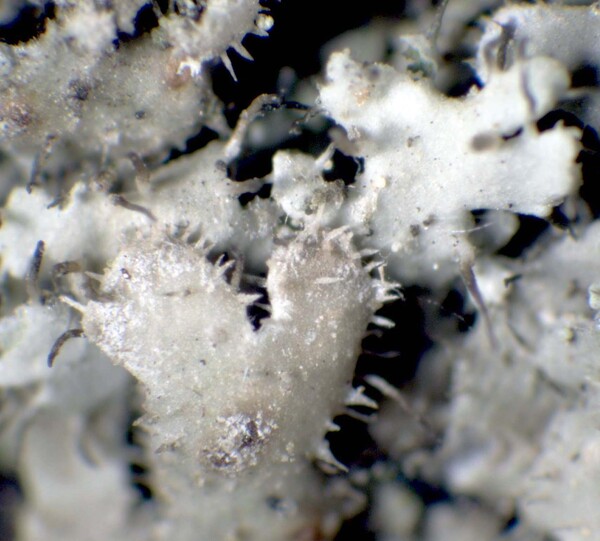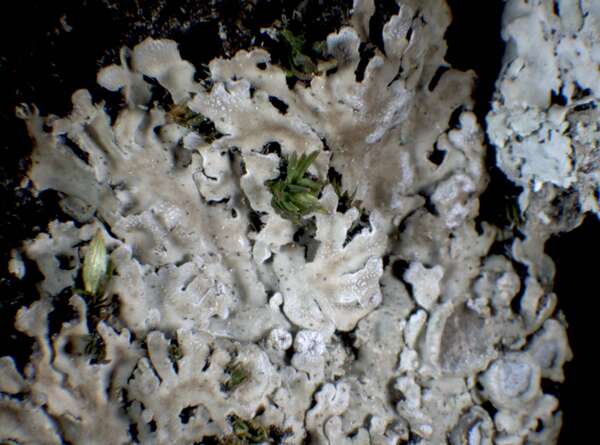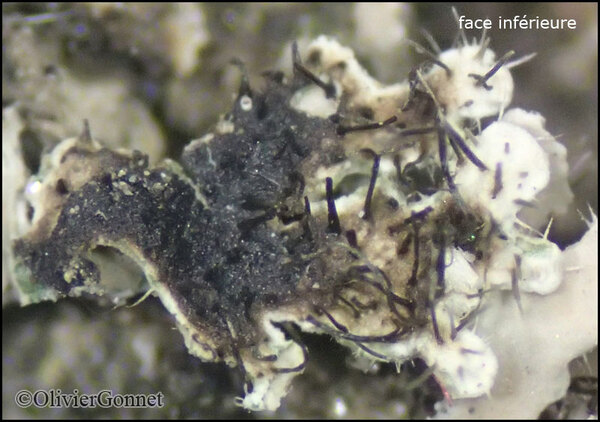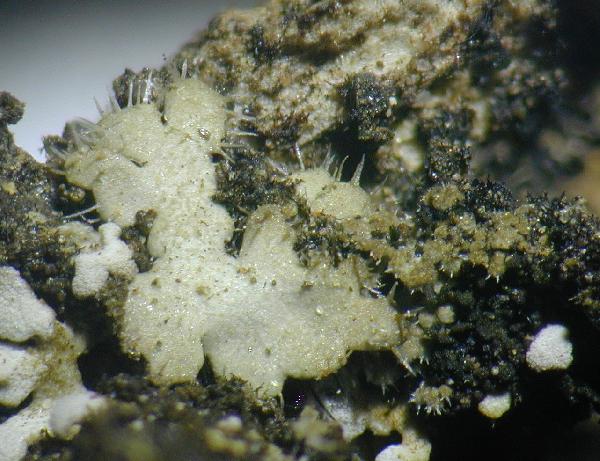Physconia servitii (Nádv.) Poelt
Nova Hedwigia, 9: 30, 1965. Basionym: Physcia servitii Nádv. - Stud. Bot. Cech., 9: 154, 1948.
Synonyms:
Description: Thallus foliose, heteromerous, dorsiventral, narrow-lobed, rather loosely adpressed, forming regular to irregular, up to 7 cm wide rosettes. Lobes elongate, 0.7-1.5(-2.5) mm wide, flat to slightly concave, often overlapping, sometimes developing secondary lobules in thallus centre, glaucous grey to (rarely) pale brown when dry, bright green when wet, often (but not always) sparsely and coarsely white-pruinose at tips, with scattered, short, thin transparent hairs which are more visible in younger parts. Lower surface black, paler at margins, with dark, squarrose, to 2.5 mm long rhizines. Upper cortex prosoplectenchymatous; medulla white; lower cortex prosoplectenchymatous, of hyphae oriented parallel to the surface in longitudinal section. Apothecia not always present, lecanorine, sessile, 0.5-2 mm across, with a brown to black, often white-pruinose disc, and a thick thalline margin which often bears hairs. Epithecium brown; hymenium and hypothecium colourless; paraphyses slender, simple or forked in upper part, the apical cells clavate, with a thin, dark brown cap. Asci 8-spored, clavate, the K/I+ blue tholus penetrated by a faintly amyloid apical cushion with parallel or diverging flanks, the wall K/I-, surrounded by a K/I+ blue outer layer, Lecanora-type. Ascospores 1-septate, brown, ellipsoid, c. 25 x 15 μm, thickened at septum but not at apices, Physconia-type. Pycnidia black, immersed. Conidia ellipsoid. Photobiont chlorococcoid. Spot tests: cortex and medulla K-, C-, KC-, P-, UV-. Chemistry: without lichen substances.
Growth form: Foliose, narrow lobed
Substrata: bark
Photobiont: green algae other than Trentepohlia
Reproductive strategy: mainly sexual
Most common in areas with a humid-warm climate (e.g. most of Tyrrenian Italy)
Commonnes-rarity: (info)
Alpine belt: absent
Subalpine belt: absent
Montane belt: very rare
Dry submediterranean belt: extremely rare
Humid submediterranean belt: rather rare
Padanian area: absent
pH of the substrata:
1 2 3 4 5
Solar irradiation:
1 2 3 4 5
Aridity:
1 2 3 4 5
Eutrophication:
1 2 3 4 5
Poleotolerance:
0 1 2 3
Altitudinal distribution:
1 2 3 4 5 6
Rarity
absent
extremely rare
very rare
rare
rather rare
rather common
common
very common
extremely common
Loading data...
Occurrence data
Predictive map
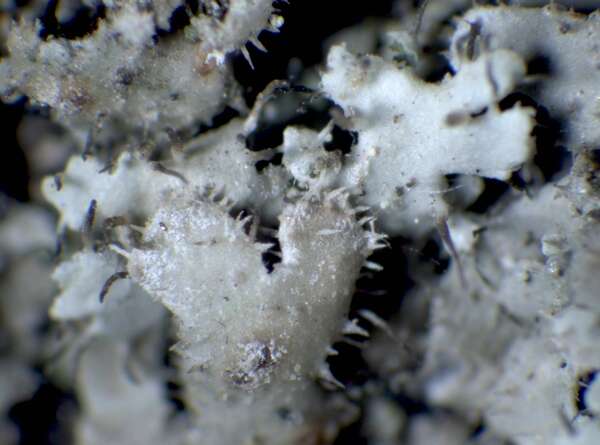
P.L. Nimis; Owner: Department of Life Sciences, University of Trieste
Herbarium: TSB
2001/12/03
young lobe with hairs on upper surface
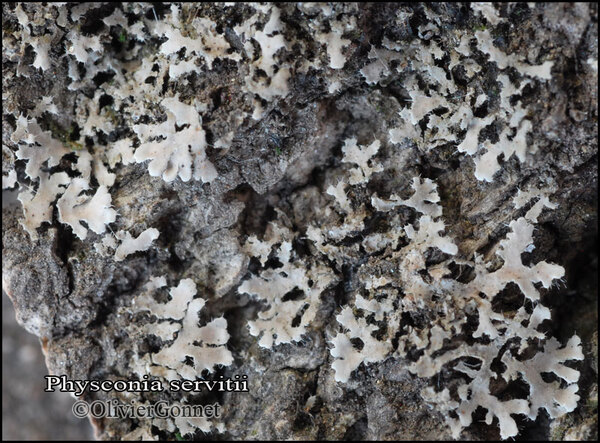
Courtesy Danièle et Olivier Gonnet - Source: https://www.afl-lichenologie.fr/Photos_AFL/Photos_AFL_P/Text_P_4/Physconia_servitii.htm
France, 29/3/2014 - sur Quercus suber âgé - Corse
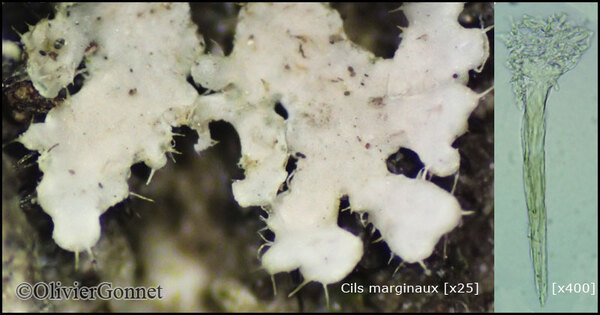
Courtesy Danièle et Olivier Gonnet - Source: https://www.afl-lichenologie.fr/Photos_AFL/Photos_AFL_P/Text_P_4/Physconia_servitii.htm
France, 29/3/2014 - sur Quercus suber âgé - Corse
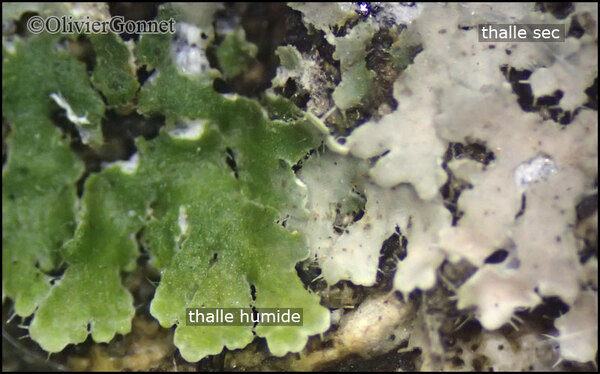
Courtesy Danièle et Olivier Gonnet - Source: https://www.afl-lichenologie.fr/Photos_AFL/Photos_AFL_P/Text_P_4/Physconia_servitii.htm
France, 29/3/2014 - sur Quercus suber âgé - Corse
Growth form: Foliose, narrow lobed
Substrata: bark
Photobiont: green algae other than Trentepohlia
Reproductive strategy: mainly sexual
Most common in areas with a humid-warm climate (e.g. most of Tyrrenian Italy)
Commonnes-rarity: (info)
Alpine belt: absent
Subalpine belt: absent
Montane belt: very rare
Dry submediterranean belt: extremely rare
Humid submediterranean belt: rather rare
Padanian area: absent
pH of the substrata:
| 1 | 2 | 3 | 4 | 5 |
Solar irradiation:
| 1 | 2 | 3 | 4 | 5 |
Aridity:
| 1 | 2 | 3 | 4 | 5 |
Eutrophication:
| 1 | 2 | 3 | 4 | 5 |
Poleotolerance:
| 0 | 1 | 2 | 3 |
Altitudinal distribution:
| 1 | 2 | 3 | 4 | 5 | 6 |
Rarity
absent
extremely rare
very rare
rare
rather rare
rather common
common
very common
extremely common
Loading data...
Occurrence data
Predictive map

P.L. Nimis; Owner: Department of Life Sciences, University of Trieste
Herbarium: TSB
2001/12/03
young lobe with hairs on upper surface

Courtesy Danièle et Olivier Gonnet - Source: https://www.afl-lichenologie.fr/Photos_AFL/Photos_AFL_P/Text_P_4/Physconia_servitii.htm
France, 29/3/2014 - sur Quercus suber âgé - Corse

Courtesy Danièle et Olivier Gonnet - Source: https://www.afl-lichenologie.fr/Photos_AFL/Photos_AFL_P/Text_P_4/Physconia_servitii.htm
France, 29/3/2014 - sur Quercus suber âgé - Corse



